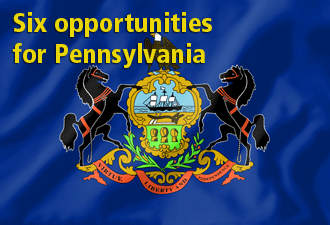Commentary

Six Opportunities for Pennsylvania
Once upon a time, “Keystone State” represented more than just a nickname, as Pennsylvania was central to America’s economy. Over the past several decades, however, our importance has diminished.
Our Commonwealth lags the rest of the nation in economic growth. We lose residents every year to other states, and we’ve surrendered-and are projected to continue to surrender-congressional seats and influence. Pennsylvania’s business climate now ranks among the worst in the nation. Furthermore, the state faces numerous economic threats that could make things even worse. However, there are several reasons to be optimistic about our return to prosperity.
Natural Gas. Extensive natural gas reserves lie beneath more than two-thirds of Pennsylvania, and new technologies make drilling the Marcellus Shale formation a potential modern-day gold rush. As of 2008, shale drilling created an estimated 29,000 jobs, and another 98,000 jobs are projected to be created in 2010. Recently, five companies bid $128 million, nearly double what was expected, to lease state-owned land for drilling.
However, the Rendell administration only sees another pot of money, and is pushing a severance tax on natural gas extraction. Of course, these companies already pay the taxes other industries do, along with lease fees and 18% of royalties, and other states have offered tax credits to small producers or delayed imposing severance taxes.
Natural gas companies are already held liable for their impact on the environment and infrastructure. If an additional severance tax is necessary, then it should be tied directly to the costs, rather than serve as a slush fund for Harrisburg politicians to spend. By welcoming these job creators, the state stands to gain in the long run.
School Choice. Since the mid-1990s, Pennsylvania has seen the creation and growth of charter schools, cyber charter schools, and the Educational Improvement Tax Credit (EITC), which incents businesses to donate to private scholarships. These programs save taxpayers money as charter schools receive about $2,500 less per pupil than school districts, and the average EITC scholarship is only about $1,100.
Although there are waiting lists for charter schools and too few EITC scholarships, these school choice programs are under attack. The EITC was reduced in the current state budget, and the Rendell administration proposed cutting cyber school funding. Instead of cutting school choice options for parents, Pennsylvania needs to expand them. Increasing the EITC limit, allowing universities to create their own charter schools, and having funding follow the child would improve Pennsylvania’s educational system dramatically.
Liquor Store Privatization. Pennsylvania is one of two states that controls both the wholesale and retail sales of wine and spirits. Divesting state stores and licensing private vendors would provide the state immediate revenue and likely increase revenue from alcohol and other taxes. Private liquor stores would create jobs while offering better service and prices to customers than a government monopoly. Recent privatization in Iowa and West Virginia shows there is little impact on underage drinking and drunk driving. Virginia and Washington are also looking to privatize their liquor stores. Now is the time to get government out of the booze business.
Repeal Corporate Welfare and Cut Taxes. Pennsylvania ranks second in “economic development” spending to Ohio, using over $750,000,000 in taxpayer funds to bribe businesses with subsidies to move to or remain in the state. Recently, Harley Davidson was awarded $15 million to stay in Pennsylvania, though it received taxpayer grants in 2000 for the same purpose.
At the same time, Pennsylvania has the 2nd highest corporate income tax in the nation. Essentially, the state is heavily taxing all businesses so it can redistribute corporate welfare to favored companies. By repealing corporate welfare, Pennsylvania lawmakers could reduce taxes and make the state more competitive.
Right-to-Work. Pennsylvania is a compulsory unionism state, meaning individuals can be forced to join a union and pay dues (or fair share fees) as a condition of employment. House Bill 50, currently sitting in the House Labor Relations Committee, would make the Commonwealth the 23rd voluntary unionism state in the nation. Right-to-work states have done better in the current recession and have stronger economic outlooks and higher average incomes (when adjusted for cost-of-living).
Electric Choice. Electricity price controls recently expired in the PPL territory, and the remaining rate caps will expire in 2011. Competition is emerging in the electricity market – PPL territory residents can choose between six energy suppliers based on prices or quality, or pay more to support renewable energy. Competition in the utility market will be better in the long run for Pennsylvanians, resulting in lower prices, better service, and energy stability.
Countless studies show that greater economic freedom results in greater prosperity for everyone. Pennsylvania has a number of opportunities to increase the economic freedom of its residents and businesses, and make itself once again the “Keystone State.”
# # #
Katrina Anderson is a research fellow and Nathan A. Benefield is Director of Policy Research with the Commonwealth Foundation (CommonwealthFoundation.org), an independent, nonprofit public policy research and educational institute based in Harrisburg.